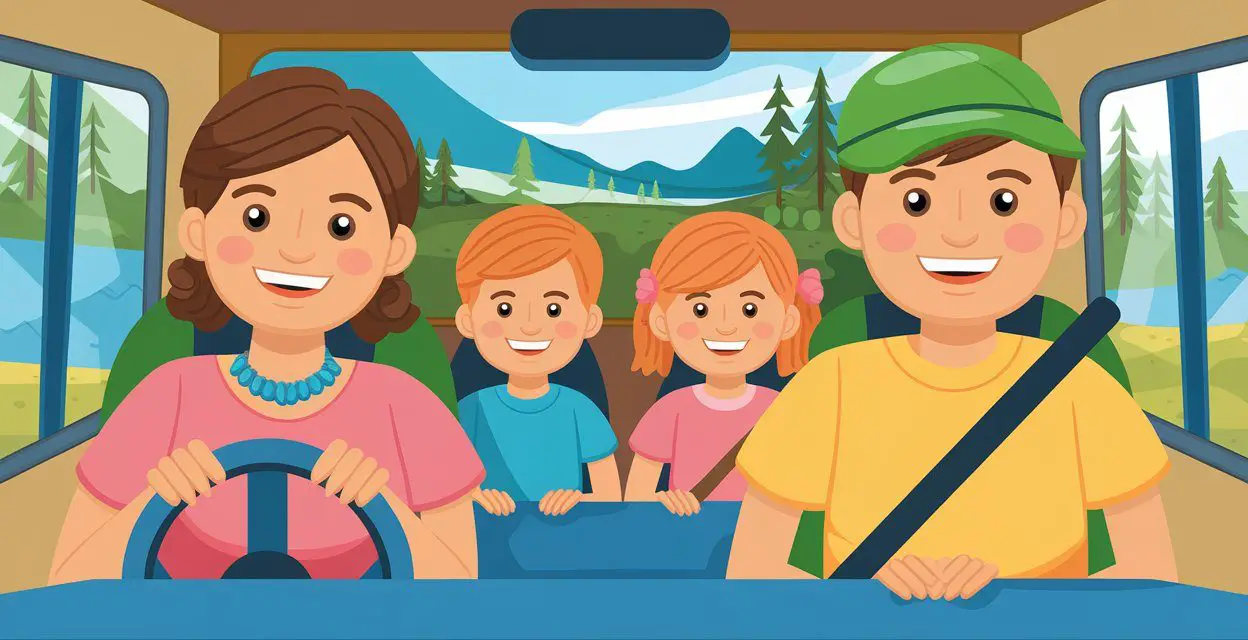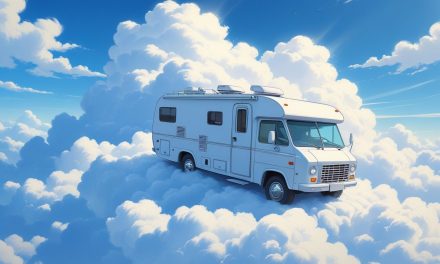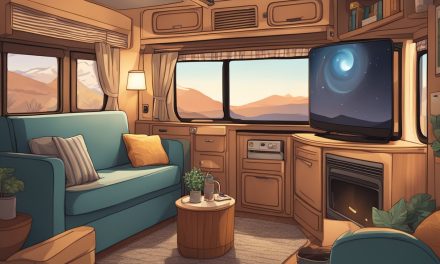Would you like to save this article?
Are RV safe to live in? Maybe your Instagram feed is full of perfect campfire photos, but you’re wondering about real RV safety, fire hazards, and poor air quality. Full-time RV living has perks and pitfalls; this post breaks down the mold growth risks, indoor air pollutants like VOCs, severe weather threats, security tips, and more.
By the end, you’ll learn how to spot issues with things like propane tanks or carbon monoxide detectors before they become big problems—plus a few secrets on keeping pests out using bug spray that’s stronger than Aunt Patty’s perfume collection.
Stick around if you want truth over filtered pictures.
Key Takeaways
- RVs offer freedom to travel and simple living, but safety risks like theft, fire hazards, and weather events (such as floods or storms) stay high due to their small space and mobility. Regular checks on alarms, propane tanks, carbon monoxide detectors, and locks help reduce these dangers.
- Health issues such as mold from humidity, poor air quality (like VOCs), pest infestations (ants or mice), and waste disposal problems are common in RV life. Keeping air moving with open windows or dehumidifiers helps prevent mold; sealing gaps keeps pests out; following campground rules ensures proper waste management.
- Full-time RV living often costs less than a house but includes hidden expenses: higher insurance rates compared to cars (sometimes 2x more), regular maintenance costs for tires or appliances, surprise repairs from breakdowns or accidents, plus campground fees that can reach hotel prices during busy seasons.
- Legal rules for full-time RVers change by state. Some areas ban you from parking overnight outside of campgrounds because of strict zoning laws—always check local codes. You must register your RV like other vehicles and may need special licenses for larger models.
- Good security habits are vital: park in well-lit areas with others nearby; use upgraded locks; install camera systems if possible. Always keep emergency kits handy—with first aid supplies—and keep up with monthly inspections for safer travels through all states and campsites.
Benefits of Full-Time RV Living
You get to roll down new roads whenever you want, following your own compass. Living in a travel trailer or big rig keeps life simple and brings fresh air right to your door.
Freedom to travel and explore
You can chase warm weather, skip rush hour traffic, and see new towns on a whim. A travel trailer or fifth wheel lets you roll into an RV park today, then move cross-country tomorrow if adventure calls.
The Dyrt app helps find campsites from state parks to wild boondocking spots with clean water and friendly faces.
Take the scenic route—you never know what you’ll discover outside your comfort zone.
Seatbelt up for safe speed, since towing capacity matters when picking your next spot. Explore big cities or remote forests at your pace. Even solo travelers find community through RV lifestyle meetups or campfire chats about tornado warnings and funny pest control tales.
Every road trip in an RV is different—there’s no one-size-fits-all routine here.
Simplified and minimalist lifestyle
Full-time RV living leads to a simplified and minimalist lifestyle. You learn to live with less. This can feel freeing. The small space pushes you to keep only what you need.
With fewer belongings, life slows down in a good way. You are more focused on experiences rather than things. Nature becomes your backdrop; it offers relaxation and beauty that you might miss in a big house.
Living simpler often means spending less money too; this can open doors for better travel or extra adventures. Embracing this lifestyle can also help improve indoor air quality if you’re mindful of VOCs from materials around you.
It may even make room for stronger connections with others in the RV community, as shared spaces foster friendship and support!
Cost savings compared to traditional housing
Living in an RV can save you money. It often costs less than traditional housing. You might think you’re getting a great deal, but hidden expenses can creep up on you. For example, insurance rates may be higher for your RV.
Maintenance is another factor; regular upkeep can eat into your savings. Campground fees can rival hotel prices during peak seasons too.
The cost of driving an RV also adds up. Accidents or mechanical issues bring extra expenses that could surprise you. Some unique risks like theft or vandalism may result in financial losses as well, which is never fun to deal with.
So while full-time RV living sounds good on paper, crunching the numbers first is smart before hitting the road and considering safety risks like theft and break-ins.
Closer connection to nature
Full-time RV living gives you a great chance to connect with nature. You can travel to beautiful places like national parks and stunning landscapes. Each trip offers new sights, sounds, and experiences that enrich your life.
Being in an RV lets you explore different ecosystems and watch wildlife up close. This lifestyle also encourages outdoor activities like hiking or fishing. As you spend more time outside, you’ll likely feel a deeper appreciation for the beauty around you and how important it is to protect our environment.
Common Safety Risks of RV Living
Living in an RV can be a fun adventure, but it comes with some safety risks. You might worry more about theft or break-ins since you’re often parked in public spots. Also, fires can happen due to the small space and appliances—so smoke detectors are key! Extreme weather like floods and hail stones can hit hard when you least expect it.
Then there’s driving; keeping an eye on speed limits and using seatbelts is crucial for road safety. Want to know what else to watch for? Keep reading!
Increased vulnerability to theft and break-ins
RVs can be easy targets for thieves. Their mobility makes them less secure than fixed homes. Many older RV models or DIY conversions lack modern security features. This increases the risk of theft and vandalism.
Upgrading your locks and installing alarms is important for better safety.
While you enjoy the freedom of RV living, don’t forget about security risks. A simple locking system might not cut it in some places. The world outside your window may seem friendly, but staying protected is key to enjoying your travels calmly.
Always park in safe areas, like well-lit RV parks with good reputations. That way, you can focus on fun adventures instead!
Fire hazards due to compact spaces and appliances
Moving from theft risks, fire hazards also loom large in RV living. RVs use lightweight, combustible materials. This means a small spark can turn into a big problem fast. In just minutes, an electrical issue or cooking accident can engulf your RV in flames.
Cooking appliances and wires are common fire starters. Propane systems also pose dangers if not handled properly. Keeping carbon monoxide detectors active is key. Regular maintenance helps catch problems before they get out of hand.
Preparing for emergencies with safety equipment adds another layer of protection against these risks.
Risks of extreme weather conditions
RVs can be at risk during severe weather. They lack the strength of traditional homes. Hurricanes, tornadoes, and floods can make living in an RV dangerous. High winds may toss your vehicle around like a toy.
Flooding can lead to serious damage or loss.
Temperature control often fails in extreme weather too. Hot summers and cold winters challenge your comfort level. Insulation isn’t as good as what you find in regular houses. You could sweat it out or freeze up inside your RV without proper preparation.
This also creates health hazards, like mold spores forming from humidity issues; using air purifiers might help some but won’t fix everything!
Driving and road safety challenges
Now, let’s talk about driving and road safety challenges in an RV. This isn’t like driving a car. RVs are bigger, heavier, and take longer to stop. You need to think about your braking distance carefully.
Make sure you keep plenty of space between you and the vehicle ahead.
Height can be a bigger problem too. Low overpasses or tree branches can surprise you if you’re not paying attention. Taking an RV driving course improves your skills; it makes handling turns easier as well.
Always wear seat belts while on the road for added safety! Understanding these unique challenges keeps you safe out there in your mobile home sweet home.
Health and Environmental Challenges
Living in an RV can come with health bumps. Mold, pests, and air quality issues might sneak in when you least expect them. You might need good pest repellents and to keep a close eye on humidity levels.
Don’t forget about waste management too; it’s key for a clean living space!
Humidity and mold concerns
Humidity can be a real problem in RVs. Cooking and showering add moisture to the air. This extra humidity leads to mold growth if you’re not careful. Mold is not just ugly; it can also cause health issues like allergies.
Keeping air flow steady helps fight this issue.
Open windows when possible, or use dehumidifiers. These tools help keep your living space fresh and clean. You want to avoid that musty smell too! Keeping things dry is key for a happy RV lifestyle, so pay attention to humidity levels every day.
Pests and infestations
Humidity can lead to mold, but pests are another problem. Ants, mice, and roaches love the cozy spaces inside your RV. They sneak in through tiny gaps and cracks. If you leave food out or have a mess on the floor, they’ll come looking for a feast.
To keep them away, seal entry points like keyholes and edges of windows. A clean RV is less appealing to these critters. Make sure to regularly sweep floors and wipe down surfaces.
Use insect-repelling sprays as extra protection too. This way, you can enjoy your travels without uninvited guests crashing your space!
Waste management and disposal issues
Living in an RV means dealing with waste management carefully. RVs have limited waste tanks that fill up quickly. Your black and gray water needs regular maintenance. If you do not dispose of it properly, you could harm the environment.
Contamination can happen easily if you’re careless.
You also face challenges with fresh water storage. Limited space may leave you without enough for hygiene or drinking needs. It’s vital to manage your water wisely to stay clean and hydrated on the road.
Keeping your RV running smoothly requires attention to all these details!
Physical and mental strain of RV living
RV living can be tough on your body and mind. Small spaces can lead to back pain and fatigue. You may find it hard to eat healthy meals on the road. Stress might also creep in from close quarters with family or friends.
Enjoying solitude while living in an RV is a challenge, especially if you are used to more space.
Mental health takes a hit too. The constant moving can feel tiring after some time. Many people miss the comforts of home, which makes adjusting hard. Regular maintenance and safety checks add extra pressure; you worry about your RV’s condition, fire hazards, or carbon monoxide detectors failing on long trips.
Staying active helps but finding balance is key in this lifestyle filled with ups and downs; it’s vital for your well-being!
How to Mitigate Risks While Living in an RV
When living in an RV, safety comes first. Install good locks and security systems to keep your home safe from theft. It’s wise to have an emergency kit ready too. Stock up on first-aid supplies and tools for unexpected problems.
Regular maintenance is key; check your tires often. A weight-distribution hitch can help with towing safely.
Choose campgrounds wisely. Research RV parks that are secure and well-reviewed by others. Stay aware of local laws, like seatbelt rules or fire safety measures near campfires. Don’t forget the importance of carbon monoxide detectors and smoke alarms inside your RV!
Invest in proper security systems and locks
You should invest in quality locks and security systems for your RV. Upgrade your locks to heavy-duty versions. This simple step can make a big difference against thieves. Install alarms, too; they deter criminals and alert you if something is wrong.
Motion-activated lights are another smart addition. They light up at night when someone approaches. Security cameras also help keep an eye on things while you relax or explore the area.
These tools add layers of safety without much hassle, allowing you to enjoy the RV lifestyle with peace of mind.
Prepare for emergencies with safety equipment
Emergencies can happen anywhere, even in your RV. Pack essential supplies to be ready. Make sure you have a first aid kit, extra food and water, and flashlights. Blankets are great for warmth too.
Always keep toolkits handy for quick fixes.
Safety equipment is key while living on the road. Carbon monoxide detectors should be installed; they save lives by alerting you to gas leaks. Have fire extinguishers within reach as well since fires can start quickly in small spaces; non-flammable items help reduce risks too.
Now that you’re set up for safety, let’s talk about safe camping spots next!
Maintain regular inspections and maintenance
After getting your safety gear in order, think about keeping your RV in top shape. Regular inspections help spot issues before they grow into bigger problems. Check the electrical and gas systems often.
Cracked wires or leaks can lead to fires, which you want to avoid.
Make a list of what needs checking each month. Look at your tires for wear and tear; keep them pumped up to the right pressure. Don’t forget to look under the hood too! A well-maintained RV means safer travels on those open roads, plus less stress while you’re living that RV lifestyle.
Choose safe and reliable camping locations
Good RV maintenance leads to safer travels. Next, let’s talk about where you park your home on wheels.
Choosing safe and reliable camping locations is key for full-time RV living. Aim for well-lit spots that are busy and secure. These areas often feel more comfortable and help prevent theft or break-ins.
Think about parking near other campers too; a friendly RV community can enhance your experience.
Avoid low-lying areas prone to flooding, especially after heavy rain. Floodwaters can damage your vehicle or put you in a tough spot during storms. Always look around before settling in; this helps keep risks low while you enjoy the freedom of the open road!
Legal Considerations for RV Living
Living full-time in an RV comes with its own set of rules. You have to know what your state and local laws say about living on the road. Zoning rules may affect where you can park your home on wheels, and you need to keep track of licensing plates too.
So, it’s wise to check up on these things often! Curious for more tips? Keep reading!
State and local regulations for full-time RV living
State and local rules can shape your RV life. Each place you stay has its own laws. Some areas may allow full-time living in an RV, while others don’t. Check zoning laws to avoid fines or trouble.
Registration is another key point. You must register your RV, just like any other vehicle. Follow state rules about inspections too; this keeps you safe on the road. Local parks have their own rules as well, so read them carefully before you settle in for a night or two.
Knowing these regulations helps ensure a smoother journey ahead into legal considerations for RV living.
Zoning rules and property use laws
Transitioning from state and local rules leads us to zoning laws. Zoning rules tell you where you can park your RV or set up a home on wheels. Each area has its own guidelines. Some places allow full-time RV living, while others do not.
You need to know these laws before making big plans. Local authorities may have strict limits on how long you can stay in one spot. This means knowing the zoning regulations is key for your safety and peace of mind as you enjoy the RV lifestyle.
Some areas might require permits too, so check ahead!
Licensing and registration requirements
Zoning rules and property use laws lead to the topic of licensing and registration requirements. Living in an RV full-time means you need to follow some legal steps. Each state has different rules for registering your vehicle, so check local guidelines.
You will likely need a special license if you’re using a larger model, like a fifth wheel trailer. Don’t forget about insurance; it costs more than standard car insurance. The bigger or fancier your RV is, the higher the price you may pay for coverage.
It’s smart to stay informed on these regulations as they can change often.
Conclusion
Living in an RV has its ups and downs. You gain freedom and adventure, but you also face risks. From fire hazards to dealing with pests, awareness is key. Being prepared can help you enjoy the RV lifestyle more safely.
With the right plans, it can be a wonderful way to live close to nature while chasing your dreams!
FAQs
1. How safe is it to live in an RV full-time?
Living in a recreational vehicle can be safe if you take health and safety seriously. You need carbon monoxide detectors, working smoke alarms, and regular RV maintenance. Watch for fire hazards like electrical fires or short circuits. Keep bug repellent handy; bugs love tiny spaces.
2. What are the biggest risks of full-time RV living?
Fire hazards top the list, especially with faulty wiring or bad tire maintenance. Exhaust fumes from combustion engines can cause trouble too, so good air flow matters. Collisions with other motorists happen more than folks think, especially if your suspension or disc brakes fail.
3. How do I protect my family from chemical exposure inside an RV?
Volatile organic compounds (VOCs) come from furniture and cleaning products inside your camper van or travel trailer. Open windows often to let fresh air flow through the space. Use natural cleaners when possible and check for allergic reactions after using new sprays.
4. Is there enough privacy when living at an RV park long-term?
Privacy feels thin sometimes; walls are close together and sound travels fast in a motorhome community as well as between sites at any busy park campground.
5. What about child safety while traveling in an RV?
Use booster seats for kids according to seatbelt laws where you drive your vehicle home on wheels! Childproof cabinets help stop accidents during sharp turns or sudden stops; crumple zones aren’t as strong here compared to big cars but airbags add some peace of mind.
6. Can I access healthcare easily while living on the road?
Telehealth makes talking to medical professionals easier now even far away from city clinics! Still bring extra drinking water just in case—hydration helps fight off illness—and keep an emergency plan ready before rolling out each day






